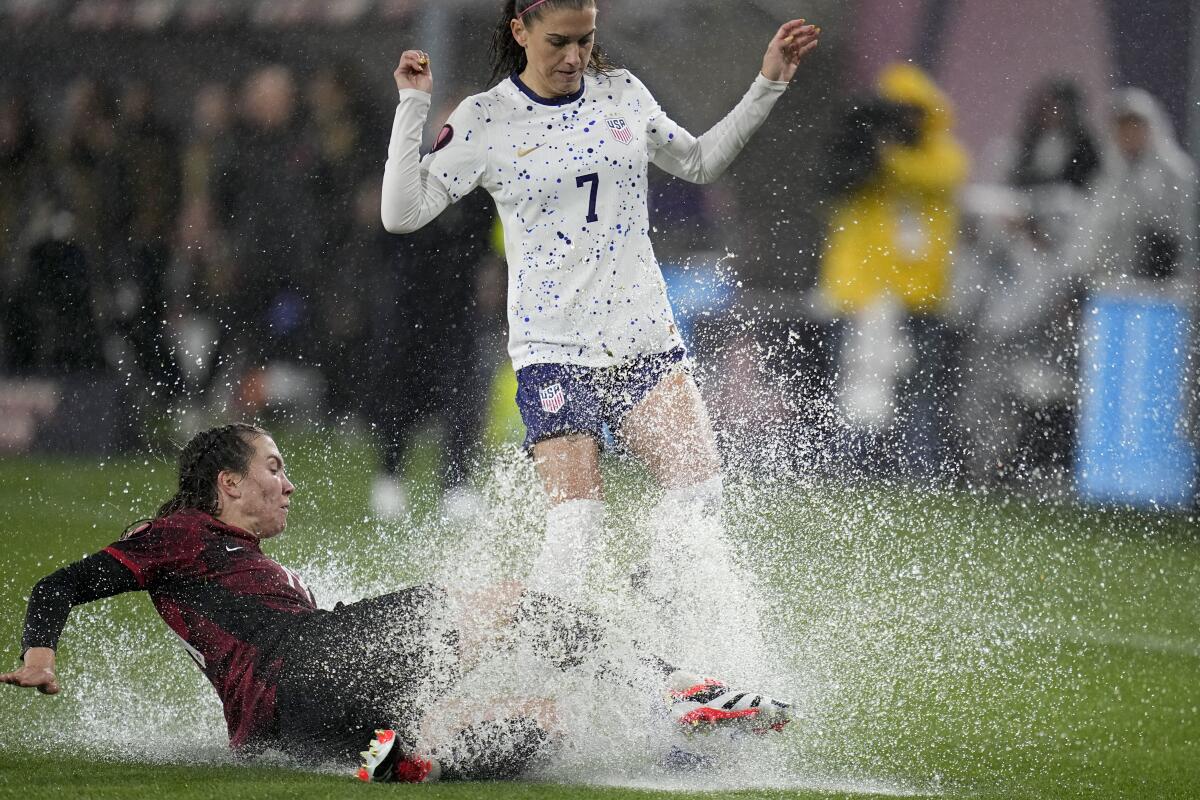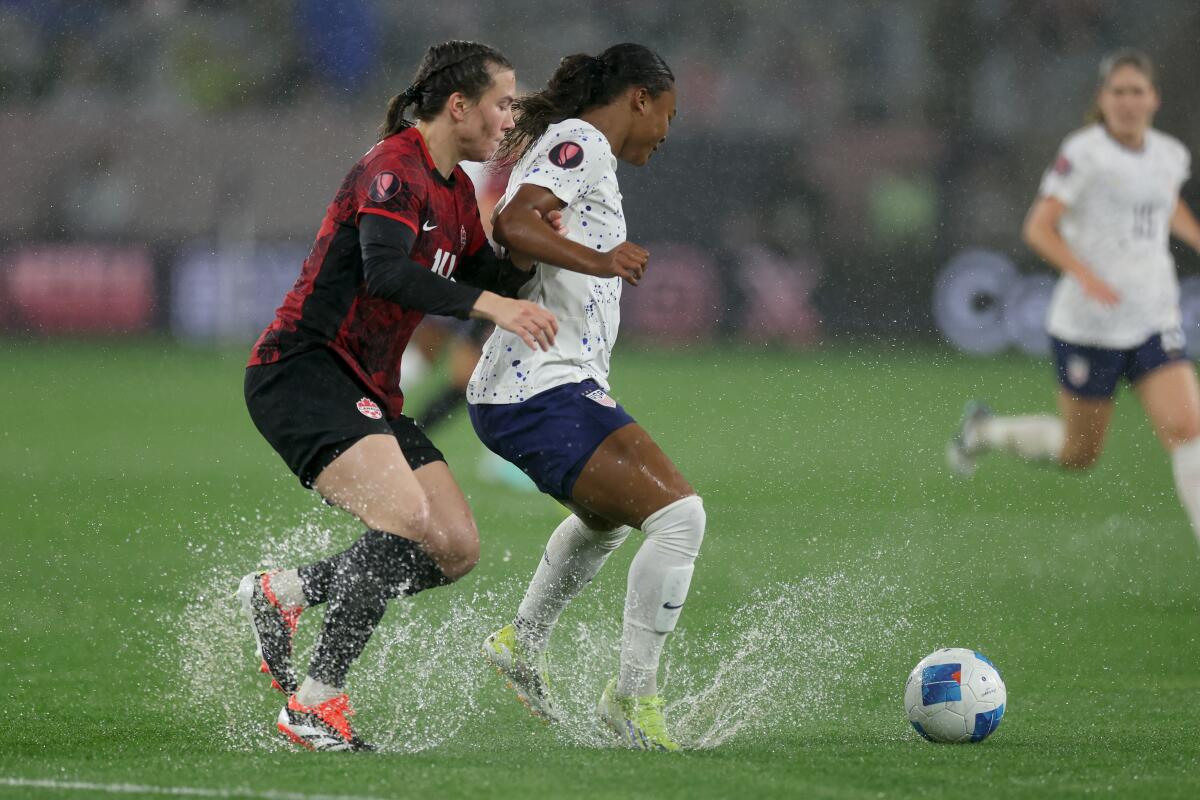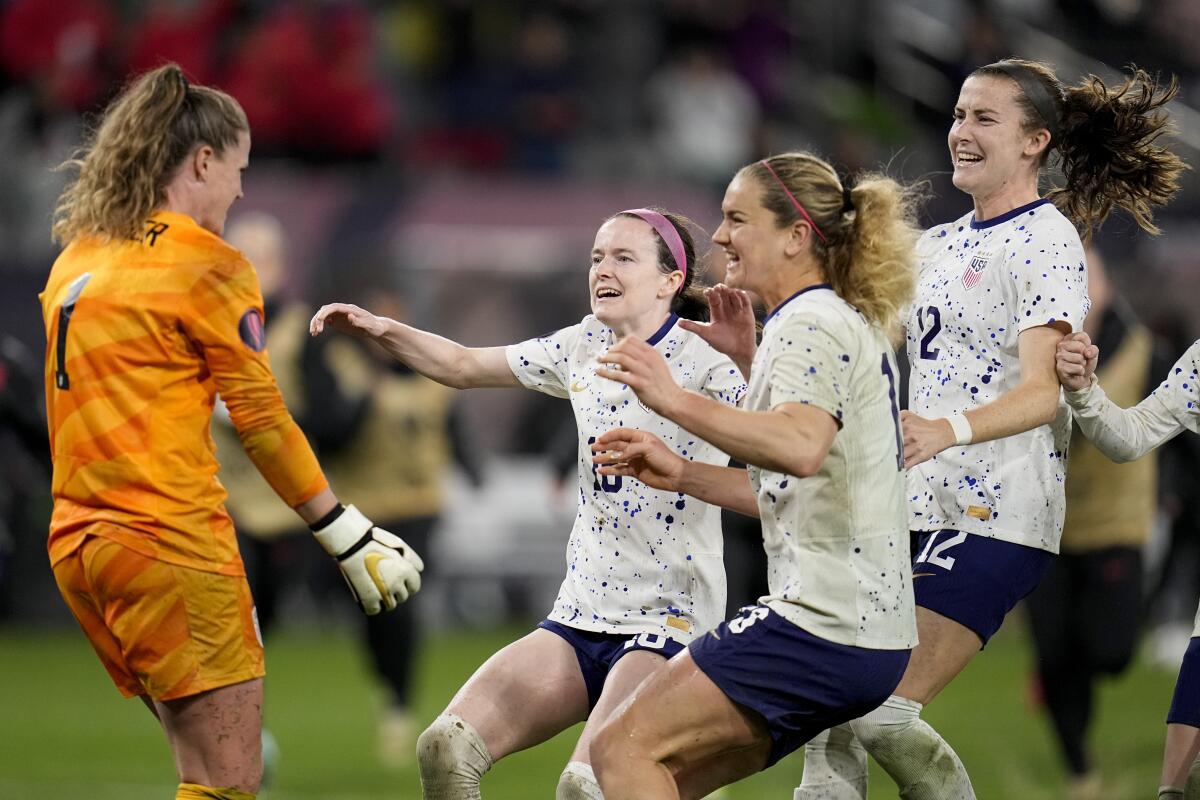U.S. overcomes rain-soaked pitch to score Gold Cup win over Canada in penalty kicks

- Share via
SAN DIEGO — The U.S. and Canada splashed their way through 120 minutes of soccer before their CONCACAF W Gold Cup semifinal was decided in penalty kicks, with the Americans advancing to Sunday’s final behind a heroic performance from goalkeeper Alyssa Naeher.
But that’s not what most people will remember about Wednesday’s game, one that finished 2-2 before being decided in penalty kicks on a chilly, rainy night at Snapdragon Stadium. What they’ll remember instead is how North America’s best two women’s teams hydroplaned their way through a game that never should have been played.
The U.S. goals came from teenager Jaedyn Shaw midway through the first half and Sophia Smith nine minutes into the first extra period. Jordyn Huitema and Adriana Leon matched that for Canada, with Huitema scoring with eight minutes left in regulation and Leon on a penalty kick on the last touch in stoppage time following the second extra-time period.
The U.S. will face Brazil, a 3-0 winner over Mexico in the first semifinal.
But as exciting as the game turned out to be, it probably should never have been played in the first place. Because whatever it was that tournament organizers thought the teams were playing, it surely wasn’t soccer.
And with a spot in the confederation’s title game at stake, both teams — as well as the sport — deserved better.
A CONCACAF spokesperson issued a statement in the first half that put the blame on Mexican referee Katia García, saying “it is solely at the discretion of the referee as to whether the field is safe and playable.”
It was neither.

A flood watch was in effect when the game kicked off on a sodden field drenched with so much standing water, players waded after well-struck passes that stopped suddenly in the puddles. The tournament schedule originally called for the U.S.-Canada semifinal to be played in the afternoon, but the order of the games was switched to accommodate television, with the Mexico-Brazil match going first on a mostly dry field.
That left the U.S. and Canada to play in a quagmire, unnecessarily putting the players at risk of serious injury since the game have been delayed until Thursday, when there was no rain in the forecast.
The impact of the wet field was obvious, with the U.S. losing three dangerous scoring chances in the first 12 minutes when the ball stopped in the muck instead of rolling. But the conditions also led to the game’s first goal when a routine back pass from Canadian defender Vanessa Giles simply stopped in the mud, allowing attacker Shaw to race around Giles and put a shot past keeper Kailen Sheridan, her club teammate with the San Diego Wave.
The goal, in the 20th minute, made Shaw the first player in USWNT history to score in each of her first four starts. The puddle should have been given an assist.
The grounds crew used what looked to be small snow shovels to push water off the field at halftime while García, the referee, jogged around the field, rolling the ball in several places to see if it would move. And while that helped — as did the rain letting up in the second half — big puddles remained.
Canada dealt with that by trying to keep the ball in the air, with the 5-foot-11 Huitema, her team’s tallest player, going high to head in an Ashley Lawrence cross for the game-tying goal in the 82nd minute, sending the game to extra time.
Smith thought she had ended it there, taking advantage of another poor decision from Giles to run on to header from Rose Lavelle before beating Sheridan cleanly. But with the final seconds of stoppage time — after two extra-time periods — Naeher collided with Giles in front of the goal.
García appeared about ready to let play continue before being summoned to the sidelines to watch a video review. She then awarded a penalty, which Leon converted for his tournament-best sixth goal.

But Naeher would be beaten just once in the shootout, making three saves and converting a try of her own.
By then just a fraction of the rain-soaked crowd, announced at 15,245, remained.
In the first semifinal, Brazil handed Mexico its first loss in 24 games under coach Pedro López. The South Americans pressured from the start, taking the lead in the 21st minute when Adriana Leal tapped a shot into an open goal after Mexican keeper Esthefanny Barreras charged off her line in an unsuccessful attempt to defend a cross.
Minutes late Nicolette Hernández was given a red card for breaking up an obvious goal-scoring opportunity, leaving Mexico short-handed with an hour left to play. Brazil quickly took advantage with Antonia curling a left-footed shot in from just outside the box to double the lead just as the rain began to fall in earnest.
Yasmim made it 3-0 three minutes into the second half with a nifty back-heel redirection of a Gabi Portilho cross. The three goals matched the most Mexico has conceded since López took over as coach in September 2022 while the three-goal margin of defeat was the worst since a 3-0 loss to Haiti 20 months ago.
And it wasn’t even that close, with Brazil controlling the ball for nearly 60 of the 90 minutes while outshooting Mexico 22-8, putting 13 on its tries on target.







